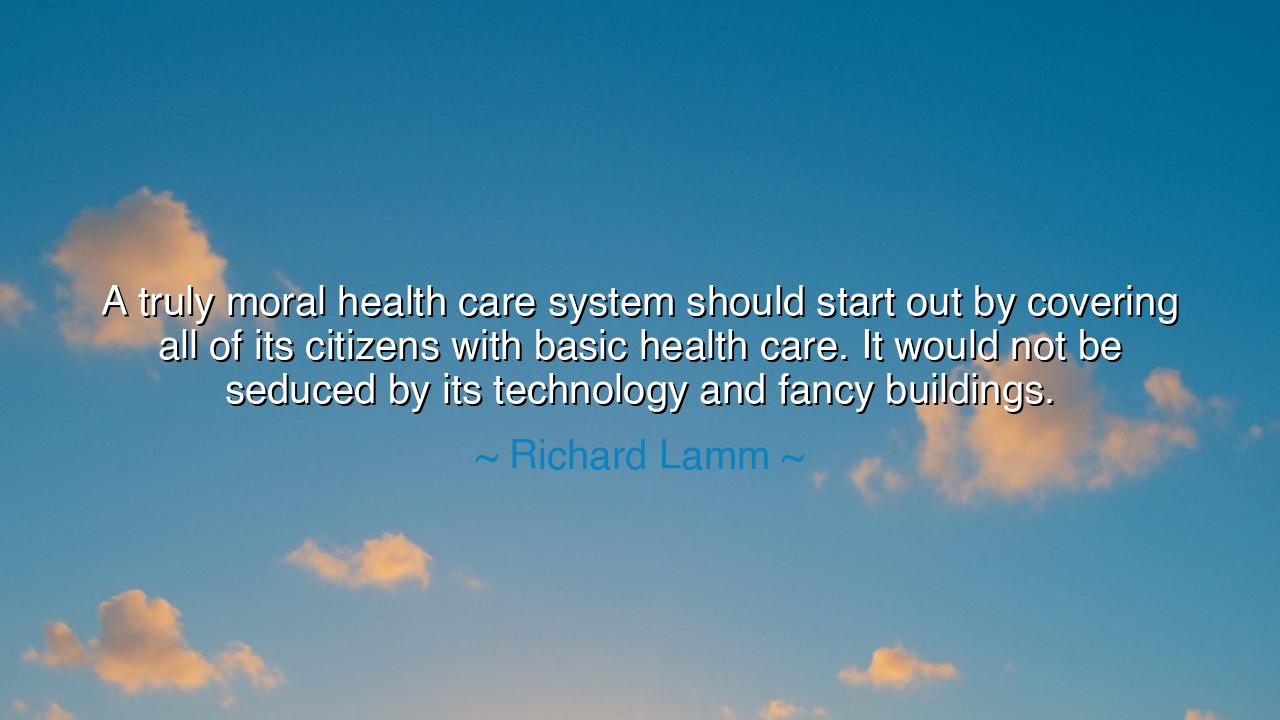
A truly moral health care system should start out by covering all
A truly moral health care system should start out by covering all of its citizens with basic health care. It would not be seduced by its technology and fancy buildings.






In the voice of Richard Lamm, there resounds a truth both moral and timeless: “A truly moral health care system should start out by covering all of its citizens with basic health care. It would not be seduced by its technology and fancy buildings.” These words are not merely the complaint of a reformer; they are the cry of a conscience awakened to compassion. They call upon nations and their leaders to remember that the essence of health care is not found in glittering machines or towering hospitals, but in the beating heart of service — the duty to care for every soul, regardless of wealth, station, or power.
In ancient times, when medicine was still bound to the wisdom of herbs and the patience of healers, the act of tending to the sick was considered sacred. Among the Greeks, Hippocrates himself — father of medicine — taught that healing was not a trade for profit, but a covenant with humanity. The healer’s first duty was not to the rich or the powerful, but to the suffering. His oath was a promise to life itself. How far, then, have we drifted from this sacred principle when hospitals gleam with glass and steel, yet the poor die outside their doors? Richard Lamm’s words strike at this hypocrisy, reminding us that morality in health care is not measured by wealth or wonder, but by justice and compassion.
To be “truly moral,” a system must see all its people as worthy of care — not as consumers, but as human beings bound by the same frailty, the same breath, the same need for healing. For illness knows no titles, and death no boundaries. The plague that once swept through medieval Europe claimed kings and peasants alike, teaching a harsh equality that many have since forgotten. Yet from that darkness rose the beginnings of hospitals built not for profit, but for mercy — sanctuaries where monks and nuns tended to the dying with devotion and love. These were not “fancy buildings,” but humble shelters filled with compassion, and in their humility lay their greatness.
Richard Lamm’s warning against the “seduction of technology” is not a rejection of progress, but a plea for balance. For even the brightest invention can become an idol if we forget its purpose. The machines that extend life should never replace the touch that comforts it. A nation that builds monuments of medicine while its children suffer untreated diseases is like a man who adorns his house with gold while his neighbor starves. The truest progress is not measured in devices, but in human dignity — in how gently we care for those who have nothing.
Consider the story of Florence Nightingale, the Lady with the Lamp, who walked through the filth and chaos of the Crimean War’s field hospitals. There were no shining halls, no marvels of science — only the wounded, the dying, and her unwavering compassion. With clean water, simple care, and relentless kindness, she transformed despair into hope. Her revolution was not born of wealth, but of moral clarity. She proved that the soul of health care lies not in luxury, but in service. Through her, we are reminded that healing begins with empathy, not with extravagance.
Thus, the message of Lamm’s words rings clear: a nation’s morality is tested not by how it treats its strongest, but by how it treats its weakest. When health becomes a privilege rather than a right, the soul of society sickens. To heal the body of the nation, we must first heal its heart — replacing indifference with compassion, greed with generosity, and pride with humility. True health care is not a market to be conquered, but a covenant to be honored.
The lesson, then, is both moral and practical. Let each of us, whether healer, citizen, or leader, strive to build systems — and lives — that place humanity before luxury. Support policies that bring care to the poor and the forgotten. Speak for those who have no voice in the halls of power. And in our daily lives, let us practice the medicine of kindness: a listening ear, a helping hand, a heart that sees suffering and does not turn away.
For in the end, the greatest health of a nation is not found in its wealth or technology, but in the mercy of its people. When we care for one another — not as patients, not as numbers, but as brothers and sisters — then, and only then, shall we possess a truly moral health care system.






AAdministratorAdministrator
Welcome, honored guests. Please leave a comment, we will respond soon